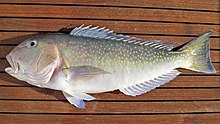
Tilefishes are mostly small perciform marine fish comprising the family Malacanthidae. They are usually found in sandy areas, especially near coral reefs. They have a long life span, up to 46 years (females) and 39 years (males).
George Sprague Myers was an American ichthyologist who spent most of his career at Stanford University. He served as the editor of Stanford Ichthyological Bulletin as well as president of the American Society of Ichthyologists and Herpetologists. Myers was also head of the Division of Fishes at the United States National Museum, and held a position as an ichthyologist for the United States Fish and Wildlife Service. He was also an advisor in fisheries and ichthyology to the Brazilian Government.
Maurice Kottelat is a Swiss ichthyologist specializing in Eurasian freshwater fishes.
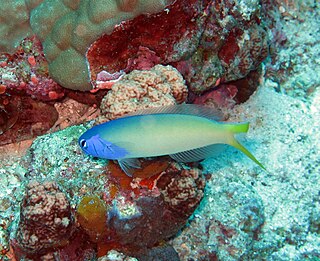
Hoplolatilus starcki, Stark's tilefish, purple-headed sand tilefish or bluehead tilefish, is a species of marine ray-finned fish, a tilefish belonging to the family Malacanthidae. This species is native to the central Indo-Pacific.

Hoplolatilus marcosi, the redback sand tilefish, is a species of marine ray-finned fish, a tilefish belonging to the family Malacanthidae. It is native to the western central Pacific Ocean.

The ocean whitefish, also known as the ocean tilefish, is a species of marine ray-finned fish, a tilefish belonging to the family Malacanthidae. It is native to the eastern Pacific Ocean.

Caulolatilus cyanops, the blackline tilefish or ocean whitefish, is a species of marine ray-finned fish, a tilefish belonging to the family Malacanthidae. It is found in the western Atlantic Ocean.

The Gulf bareye tilefish, also known as the anchor tilefish, is a species of marine ray-finned fish, a tilefish belonging to the family Malacanthidae. It occurs in the western Atlantic Ocean.
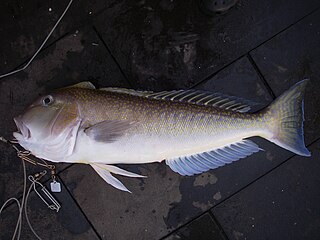
The great northern tilefish or golden tile, is the largest species in the family Malacanthidae (tilefishes). It grows to a length of between 38 and 44 inches. The great northern tilefish is a slow-growing and long-lived species that has four stages of life. After hatching from eggs, the larvae are found in plankton. As they grow into juveniles, the individuals seek shelter until finding or making their own burrows. As adults, the tilefish continue to expand their burrows in the sediment throughout their lives. The diet of the larvae is unknown, but presumed to consist of zooplankton; juveniles and adults feed upon various benthic invertebrates, crustaceans, and fish. After reaching sexual maturity between 5 and 7 years of age, females lay eggs throughout the mating season for the male to fertilize, with each female laying an average of 2.3 million eggs.

The blue blanquillo, also known as the banded blanquillo, striped blanquillo, false whiting, sand tilefish or eye of the sea, is a species of marine ray-finned fish, a tilefish belonging to the family Malacanthidae. It is found in the Indo-Pacific.
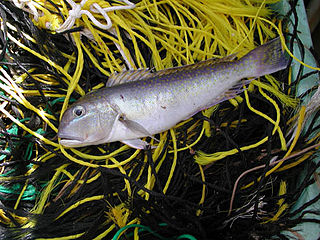
Lopholatilus is a small genus of tilefishes native to the western Atlantic Ocean.

Branchiostegus is a genus of marine ray-finned fishes, tilefishes, belonging to the family Malacanthidae. They are found in the eastern Atlantic Ocean through the Indian Ocean to the western Pacific Ocean. Here they create burrows in soft substrates in the comparatively deep waters of the continental shelf and slope.

Panna is a genus of marine ray-finned fish belonging to the family Sciaenidae, the drums and croakers. These fishes are found in southern and southeast Asia.

Malacanthus brevirostris, the quakerfish, flagtail blanquillo, false whiting or stripetail tilefish, is a species of marine ray-finned fish, a tilefish belonging to the family Malacanthidae. It has a wide Indo-Pacific distribution.
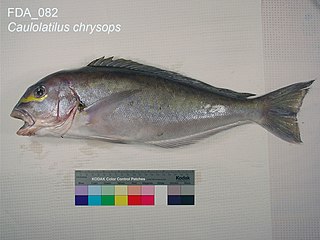
Caulolatilus chrysops, the Atlantic goldeneye tilefish or gold face tilefish, is a species of marine ray-finned fish, a tilefish belonging to the family Malacanthidae. It occurs in the western Atlantic Ocean.

Malacanthus plumieri, the sand tilefish, is a species of marine ray-finned fish, a tilefish belonging to the family Malacanthidae. It is found in the western Atlantic Ocean.
Marie-Louise Bauchot is a French ichthyologist and assistant manager of the National Museum of Natural History, France.
Branchiostegus paxtoni, or Paxton's tilefish, is a species of marine ray-finned fish, a tilefish belonging to the family Malacanthidae. It is found in the Eastern Indian Ocean and is known only from a locality 190 km northwest of Port Hedland, Western Australia. This species reaches a length of 25.5 cm (10.0 in).
Branchiostegus gloerfelti, the Australian tilefish, is a species of marine ray-finned fish, a tilefish belonging to the family Malacanthidae. So far it has only been found in the southwest Sumatra to Bali Strait in Indonesia. This species reaches a length of 25.5 cm (10.0 in).

Branchiostegus wardi, or Ward's tilefish, is a species of marine ray-finned fish, a tilefish belonging to the family Malacanthidae. It is found from Australia to New Caledonia and Papua New Guinea. This species reaches a length of 40 cm (16 in).
